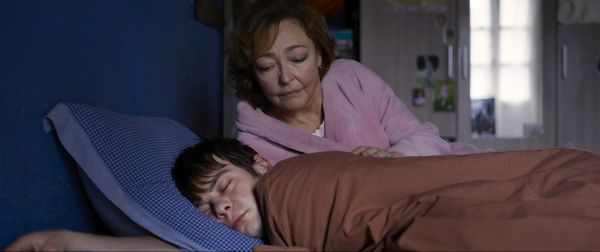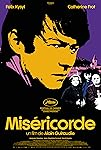Eye For Film >> Movies >> Misericordia (2024) Film Review
Misericordia
Reviewed by: Marko Stojiljkovic

Some might say that from the French auteur Alain Guiraudie we should expect the unexpected (which is a stupid expression: if we expect a curve ball, a straight one would come as a surprise), but his signature films could be boiled down to navigating social situations in peculiar settings. For instance, with his biggest festival hit Stranger By The Lake (2013), it was the exploration of “cruising” and the possibility of romance in a secluded gay community affected by an investigation of a murder that happened inside it. Likewise, his recent Nobody’s Hero (2022) was basically a bedroom farce set against the backdrop of terrorist attacks in Clermont-Ferrand.
Misericordia is more difficult to define, since it combines the genres of mystery-thriller, relationship and psychological drama with hints of a character study and, once again, farce, in a remote, sparsely populated French village. It premiered in Cannes and we caught it at Sarajevo, where it was screened as a part of Kinoscope non-competitive section.

The way Guiraudie opens the film is significant and it speaks volumes in complete silence. A man who will later become known to us as Jérémie (Félix Kysyl) drives his car through the alpine landscape of southern France in minutes-long scene. Judging by the brown-grey tones, it is way into autumn, and far out of any vacationing season, suggesting that he is a man on a certain mission. The other detail, the absence of any kind of music or talk radio - for a ride we perceive as long - in a nondescript modern car that certainly has those features, or even his own humming to keep him awake, suggest that boyishly-looking Jérémie is a bit of a “tabula rasa” (to use the Latin expression to fit with the film’s title).
That turns out to be true, to some extent, as the people he meets in his childhood village are quick to project their own desires on him. He is there to attend the funeral of his mentor and first boss, local baker Jean-Pierre. After the funeral itself, he continues to the house of the late baker’s widow Martine (Catherine Frot) who greets him warmly and invites him to stay overnight, while Jean-Pierre’s and Martine’s son, Vincent (Jean-Baptiste Durand), who was once Jérémie’s schoolmate, is a bit suspicious about his intentions. He thinks that Jérémie came to seduce the still-attractive Martine in order to rob him of his inheritance, while the widow thinks the polite young man actually had something with her late husband in the past.
The overnight stay turns into a few days of vacation that threatens to become a permanent move - complete with the take-over of the bakery - as Jérémie meets people from his past, including unkempt semi-hermit Walter (David Ayala), or new people, such as the sinister-looking, mushroom-picking priest (Jacques Develay) who shows some very unchristian interest in him. Who is trying to seduce Jérémie? Whom is he trying to seduce and why? And will the horseplay, turning to violent fight, turning to murder in the woods (slightly recycled from Stranger By The Lake, but not quite) turn the tables and flush out the protagonist’s motivation?
Once again, Guiraudie proves himself the master of setting up a mystery by the means of perfect script economy that functions strictly on “need to know” basis. There's no excessive exposition, and there are no flashbacks to explain the characters’ motivations, although some items and sentiments from the past resurface. However, there is a sense that everybody plays everybody here and that everybody wants something from Jérémie - or wants him to be something for them - and all those desires stand in conflict with one another, while Jérémie also has his own agenda, unbeknown to the viewers.
The actors are instructed to keep the motivations of their characters under wraps, either by hiding certain things or exaggerating others. The appearance of Sébastien Faglain and Salomé Lopes as the local gendarme and his younger colleague is a valuable addition to the already perfectly selected cast, but their characters’ focus on their internal banter and circumvention is yet another example of Guiraudie’s perfect script control. As the director, he also demonstrates a perfect sense of measure in the terms of camera placement and each shot duration, utilising the camerawork of the now-hot Claire Mathon and calibrating the editing of Jean-Christophe Hym.
As it is often the case with Guiraudie’s films, Misericordia also feels a little arbitrary regarding its a tad over the 100-minute-mark runtime and the changes of rhythm, pace or even focus within it, which might suggest either a strong filmmaking vision or, on the contrary, some kind of improvisation. Whichever is the case, Misericordia might be the filmmaker’s “straightest” work up to date, but it is pretty playful in its relative austerity, functional as the mystery and intriguing as a study of weird human behaviour.
Reviewed on: 03 Sep 2024















